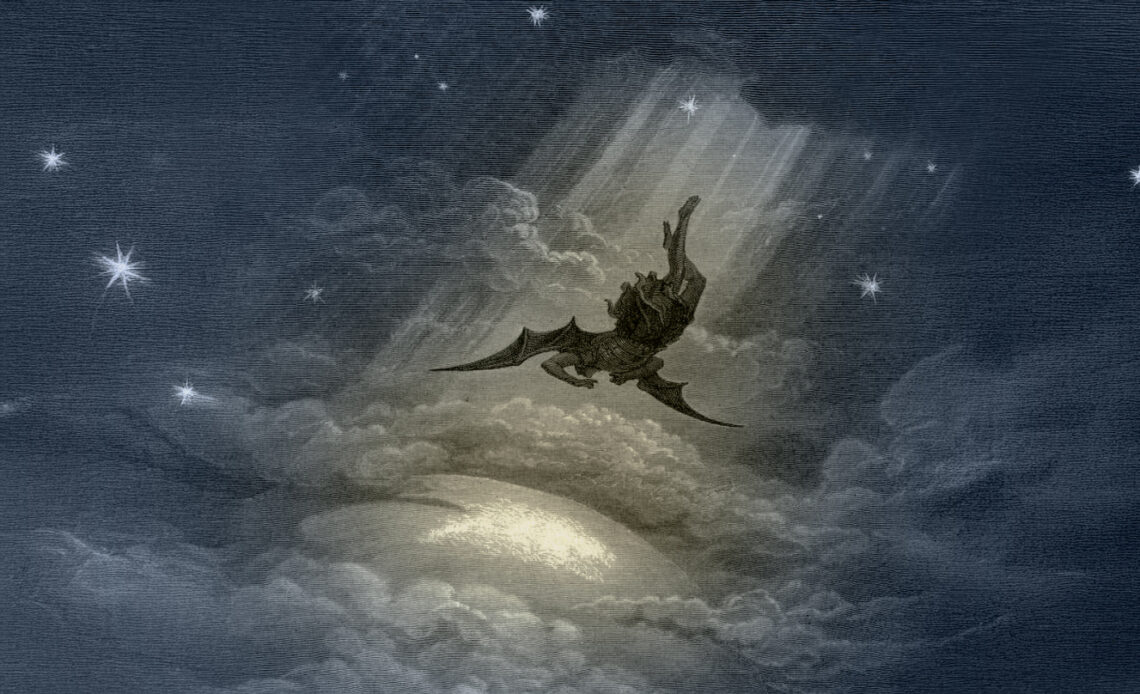
Considering the Fall of Neil Gaiman
I would read other books, of course, but in my heart I knew that I read them only because there wasn’t an infinite number of Narnia books to read … C.S. Lewis was the first person to make me want to be a writer.
(Neil Gaiman, keynote speech, “Mythcon 35”)
The celebrated English fantasy author, Neil Gaiman, has been shot out of the sky. In August, a podcast began to detail allegations of sexual abuse made against him by five different women. Last week, New York Magazine published a longer and more horrifically detailed catalogue, partly supported by testimonies from new victims. The new article is convincing and compelling (also sickening—I strongly suggest that you don’t read it). Gaiman has tried to respond (“It was all consensual … I’m still learning”), but nobody is buying it. He is finished. His film and TV adaptations are being cancelled. At the height of his professional success, he has fallen from grace.
The man has tried to respond, but nobody is buying it. He is finished.
There are so many things that we might talk about in the light of this wretched exposure: Gaiman’s hypocrisy (eclipsing even that of Joss Whedon); the willingness of other “right thinking” (I mean impeccably progressive) people to cover for him; the folly of writer-idolatry and its prevalence in con-culture; the universal temptation of power to corrupt.
Fantasy and its Dangers
Others have already begun with those dissections. My interest in Neil Gaiman at this final moment in his career is the same as it has been hitherto. Gaiman is a lover of myth, wonder and the numinous; he was shaped by C.S. Lewis and J.R. R. Tolkien. Although I have never ranked him as one of my favourite novelists, I have always kept an eye on what he is writing. I tend to be interested in the things he is interested in and often resonate with the things he says.
And that’s why I am not terribly surprised at where he has ended up. [N.B. Nothing that follows here is meant to (a) fully explain Gaiman’s actions or, much less, (b) render them excusable in any sense.]
Back in 2023, I wrote a blog post (“Narnia Must Die”) warning about how myth and fantasy can go bad on us if we think they will supply us with ultimate meaning and wonder. That post drew heavily from C.S. Lewis’s The Weight of Glory and Surprised by Joy. But in light of these recent developments, it might be worth adding some quotes from another of Lewis’s works, namely The Pilgrim’s Regress. In this somewhat allegorical autobiography, Lewis talks about a more specific way the desire for transcendence might go bad:
I dreamed that I saw John growing tall and lank till he ceased to be a child and became a boy. The chief pleasure of his life in these days was to go down the road and look through the window in the wall in the hope of seeing the beautiful Island. Some days he saw it well enough, especially at first, and heard the music and the voice. At first he would not look through the window into the wood unless he had heard the music.
But after a time both the sight of the Island, and the sounds, became very rare. He would stand looking through the window for hours, and seeing the wood, but no sea or Island beyond it, and straining his ears but hearing nothing except the wind in the leaves. And the yearning for that sight of the Island and the sweet wind blowing over the water from it, though indeed these themselves had given him only yearning, became so terrible that John thought he would die if he did not have them again soon. He even said to himself, ‘I would break every rule on the card for them if I could only get them.
The vision of the island and sea that John so desperately wants to recapture represents what he elsewhere calls “Joy”—a sense of longing for a true home, a glimpse or brief encounter with ultimate beauty. Finally, as his encounters with it become few and farther between, he settles for ecstasies of another kind:
There in the grass beside him sat a laughing brown girl of about his own age, and she had no clothes on.
“It was me you wanted,” said the brown girl. “I am better than your silly Islands.”
And John rose and caught her, all in haste, and committed fornication with her in the wood.
The girl is described as “brown”, which is distractingly offensive to modern sensibilities, but signifies sensuality in the lexicon of orientalism. She represents sexual abandon; noble savagery untamed by Western morality and the norms of Christendom. Later on, John encounters a bunch of cool cat intellectuals (“Clevers”) who serve him up the same thing in a more sophisticated form. They too try to tell him that it is what he has really been looking for. But John has been burned before:
“No, no,” cried John. “I know you are wrong there. I grant you, that—that sort of thing—is what I always get if I think too long about the Island. But it can’t be what I want.”
So goes the post-Enlightenment West according to Lewis. We reach for heaven and end up in the mud; we start out reading about gods and somehow find ourselves pawing dirty magazines (though sometimes they come with sophisticated titles). Thus too, we might add, goes the “progress” of the fantasy genre from Lord of the Rings to Game of Thrones. Or, more to the point, from Narnia to American Gods.
We reach for heaven and end up in the mud; we start out reading about gods and somehow find ourselves pawing dirty magazines.
In The Pilgrim’s Regress, John searches for a distant island and lost sea. There is another elusive sea in Neil Gaiman’s own (semi-) autobiographical book, The Ocean At The End Of The Lane: a duckpond that is also, without any real explanation, a symbol of the lost childhood wonder and the whole world of imagination and myth.
I don’t know if the parallel is deliberate. But the differences are significant. For Lewis, the Island represents a longing so great that it can only be satisfied by Something Infinitely Good—the Source of all beauty and wonder. For Gaiman the path curves backwards, vanishing into the weeds of nostalgia and let’s-pretend-without-really-believing paganism.
Gaiman’s version doesn’t really work. As Gaiman writes in the prologue of Ocean: “I make art, sometimes I make true art, and sometimes it fills the empty places in my life. (Some of them. Not all).” In a 2017 interview with Adam Savage, he put it even more succinctly: “I’ve been looking for ‘there’ for so long, and every time I think I reach it just turns out to be another ‘here'”
Unfulfillable desires—and especially God-shaped holes—have a way of producing bad behaviour. C.S. Lewis warns of foolish romantics, who “spend their whole lives trotting from woman to woman … thinking that the latest is ‘the Real Thing’ at last, and always disappointed.” Maybe that’s what’s going on with Gaiman—though these allegations make it sound like he has long ago seen through romance, and is now ruled by much darker urges. It is the curse of the rich and powerful to drink more deeply from the cup of depravity—and experience the ensuing emptiness in equal proportion.
Missing the Point
My point, however, is simply this: Gaiman seems to have missed the central concerns of the great writer he once adored. Having refused to yield to the great and true Author of myth he has lost himself in lesser (and sometimes evil) fantasies.
Of course, it might be even worse than that. He might have actively rejected those warnings. I once read Gaiman’s fictional response to the “Problem of Susan” (again, don’t read it) where he made Aslan and The White Witch allies. Its obscenity seemed to me like an attempt to exorcise himself of Aslan, or at least (and more hopefully) like Edmund drawing spectacles on the stone lion.[1]
I have noticed other, more disturbing, Lewis echoes in Gaiman. In Ocean, he has his childhood alter ego saying things that sound disturbingly like the demoniac villain of Perelandra. For example:
I saw the world I had walked since my birth and I understood how fragile it was, that the reality was a thin layer of icing on a great dark birthday cake writhing with grubs and nightmares and hunger. (Ocean)
All the things you like to dwell upon are outsides. A planet like our own, or like Perelandra, for instance. Or a beautiful human body. All the colours and pleasant shapes are merely where it ends, where it ceases to be. Inside, what do you get? Darkness, worms, heat, pressure, salt, suffocation, stink. (Perelandra)
And again:
I thought I was looking at a building at first: that it was some kind of tent, as high as a country church, made of gray and pink canvas that flapped in the gusts of storm wind, in that orange sky: a lopsided canvas structure aged by weather and ripped by time. And then it turned and I saw its face, and I heard something make a whimpering sound, like a dog that had been kicked, and I realized that the thing that was whimpering was me. (Ocean)
I dreamed I was lying dead—you know, nicely laid out in the ward in a nursing home with my face settled by the undertaker and big lilies in the room. And then a sort of a person who was all falling to bits—like a tramp, you know, only it was himself not his clothes that was coming to pieces. (Perelandra)
I don’t know if these similarities are intentional, unconscious or simply coincidental, but it is worrying that Gaiman uses the same images for himself as a despairing revenant temporarily released from hell. Has the boy who loved Lewis so much that he became a writer finally become Edward Weston?
I hope not. I pray that Neil Gaiman’s story ends like Edmund’s and not Weston’s. His abuse of women and sex is very very wicked. If all the allegations are all true, it seems self-evident that he should be sent to prison. But these are also the sort of thing that Jesus died for.[2] I wish Neil Gaiman would repent; that he would go back to where he started and find the God of Narnia: the holy God who forgives sins and changes lives; the God of happy endings; the author of the good story that goes on and on.
[1] In the same address quoted at the start of this article, Gaiman speaks of his disappointment on noticing the “allegorical” elements in Narnia:
I was personally offended: I felt that an author, whom I had trusted, had had a hidden agenda … I think, that it made less of Narnia for me, it made it less interesting a thing, less interesting a place. Still, the lessons of Narnia sank deep.
Others have expressed similar sentiments. But filing Narnia away under “Christian Propaganda” misses the point. Lewis insists that Narnia is not allegory but a “supposal” of the Reality who is the Truth behind all truth. His Aslan and Emperor are not simply cardboard stand-ins for English Anglicanism; they are, for Lewis, the source of all myths, mystery and beauty. Lewis writes as a pre-eminent scholar of literature and lover of pre-Christian classics, not just a Christian. Bible readers love Narnia, but someone who had only read the Bible could never have written those books.
[2] To anticipate three objections: (i) If the prison thing is true, it is true whether he repents or not. Jesus’ dying for our sins before God is not the same as the state excusing our crimes toward other humans. (ii) Don’t his victims deserve prayer more than him? Yes. (iii) Am I claiming Christians are immune from this sort of thing? Absolutely not, but I am asserting that the one who offers to eternally satisfy our thirst (c.f. John 41-26) gives Christians resources that are not available otherwise. Whether that is plausible to you, reader, may depend on the particular Christians you have known; but Jesus himself is the only thoroughly trustworthy man. Of course, that’s the main point of the religion.




